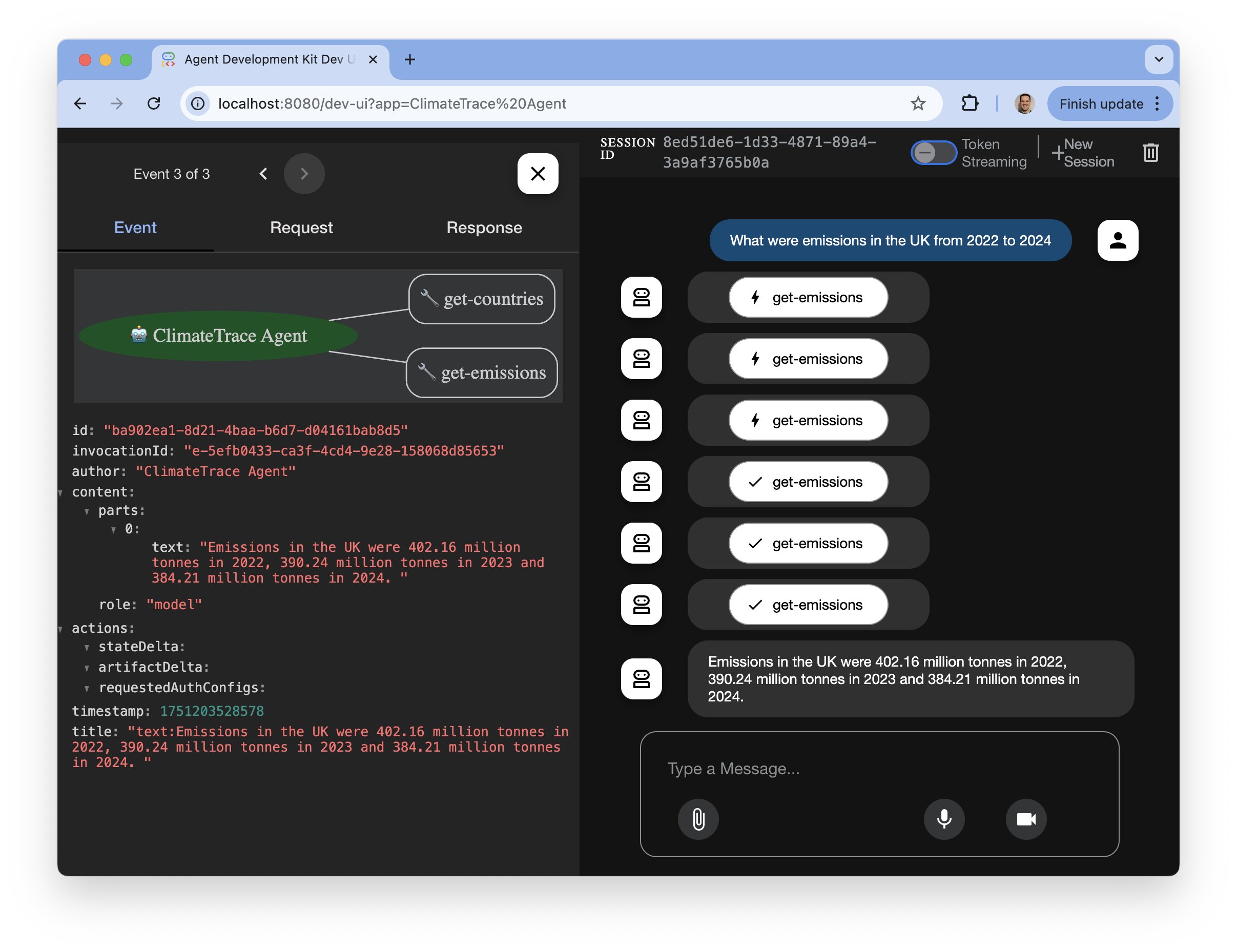Google’s Agent Development Kit for Java is described as “an open-source, code-first Java toolkit for building, evaluating, and deploying sophisticated AI agents with flexibility and control”. In this article we’re going to see how it can be consumed in Kotlin code (specifically in the agents module in the ClimateTrace Kotlin Multiplatform sample).
The first thing we need to do is add the following gradle dependencies to our project (0.2.0 being the latest version at time of writing this).
1
2
implementation("com.google.adk:google-adk:0.2.0")
implementation("com.google.adk:google-adk-dev:0.2.0")
ADK works with the following LLM providers and shown below is an example of creating a Gemini based model.
- OpenAI
- Anthropic
- OpenRouter
- Ollama
1
2
3
4
5
6
val model = Gemini(
"gemini-1.5-pro",
Client.builder()
.apiKey(apiKeyGoogle)
.build()
)
With the model created we can now create our AI agent. We’re also providing tools to the agent….more about that in a later section.
1
2
3
4
5
6
7
val agent = LlmAgent.builder()
.name(NAME)
.model(model)
.description("Agent to answer climate emissions related questions.")
.instruction("You are an agent that provides climate emissions related information. Use 3 letter country codes.")
.tools(tools)
.build()
The following then shows how we can run the agent with the given prompt.
1
2
3
4
5
6
7
8
9
10
11
12
13
14
15
16
17
18
19
20
21
22
23
24
25
26
27
28
fun main() {
val runner = InMemoryRunner(initAgent())
val session = runner
.sessionService()
.createSession(NAME, USER_ID)
.blockingGet()
val prompt =
"""
Get emission data for EU countries in 2024.
Use units of millions for the emissions data.
Show result in a grid of decreasing order of emissions.
""".trimIndent()
val userMsg = Content.fromParts(Part.fromText(prompt))
val events = runner.runAsync(USER_ID, session.id(), userMsg)
events.blockingForEach(Consumer { event: Event ->
event.content().get().parts().getOrNull()?.forEach { part ->
part.text().getOrNull()?.let { println(it) }
part.functionCall().getOrNull()?.let { println(it) }
part.functionResponse().getOrNull()?.let { println(it) }
}
if (event.errorCode().isPresent || event.errorMessage().isPresent) {
println("error: ${event.errorCode().get()}, ${event.errorMessage().get()}")
}
})
}
Tools
A Tool in this context “represents a specific capability provided to an AI agent, enabling it to perform actions and interact with the world beyond its core text generation and reasoning abilities”. Shown below are examples of creating both MCP and “Function Tools”.
MCP Tools
The following shows an example of how we can create an MCP Server tool…the MCP Server in this case developed using the Kotlin MCP SDK.
1
2
3
4
5
6
val tools = McpToolset(
ServerParameters
.builder("java")
.args("-jar", "<path to climate trace mcp server jar file>", "--stdio")
.build()
).loadTools().join()
Function Tools
We can also provide what are known as function tools (just local funtions that provide some functionality to our AI agent). Here we need to call Kotlin suspend functions from those tools and, as such, are specifically using ADK’s Long Running Function Tools. These need to return an RxJava Single so we need to use the following dependency to allow us to wrap invocation of our Kotlin suspend functions with rxSingle.
1
implementation ("org.jetbrains.kotlinx:kotlinx-coroutines-rx3:1.10.2")
And these are the tools we’re using. The methods need to be static to be consumed by the Java based ADK code so we include in a companion object and annotate with @JvmStatic. Note were invoking shared KMP code here (ClimateTraceRepository) managed using the Koin DI framework.
1
2
3
4
5
6
7
8
9
10
11
12
13
14
15
16
17
18
19
class ClimateTraceTool {
companion object {
val climateTraceRepository = koin.get<ClimateTraceRepository>()
@JvmStatic
fun getCountries(): Single<Map<String, String>> {
return rxSingle {
mapOf("countries" to climateTraceRepository.fetchCountries().toString())
}
}
@JvmStatic
fun getEmissions(countryCode: String, year: String): Single<Map<String, String>> {
return rxSingle {
mapOf("emissions" to climateTraceRepository.fetchCountryEmissionsInfo(countryCode, year).toString())
}
}
}
}
1
2
3
val getCountriesTool = LongRunningFunctionTool.create(ClimateTraceTool::class.java, "getCountries")
val getEmissionsTool = LongRunningFunctionTool.create(ClimateTraceTool::class.java, "getEmissions")
val tools = listOf(getCountriesTool, getEmissionsTool)
ADK Dev UI
ADK also includes a developer web UI to help with agent develoment and debugging. It works by scanning a list of source folders provided to it for agents and this setup right now requires that we provide a Java file such as following.
Agent.java
1
2
3
public class Agent {
public static BaseAgent ROOT_AGENT = initAgent();
}
We’ve also created a gradle task to allow launching that dev UI.
1
2
3
4
5
6
7
tasks.register<JavaExec>("devUi") {
group = "application"
description = "Start the ADK Dev UI server"
mainClass.set("com.google.adk.web.AdkWebServer")
classpath = sourceSets["main"].runtimeClasspath
args = listOf("--adk.agents.source-dir=src/main/java")
}
Update: 19th September 2005
With ADK 0.3.0 the process of setting up ADK Dev UI has been simplified.

Featured in Android Weekly #683
Related tweet
Using Google's Agent Development Kit for Java from Kotlin code https://t.co/MABiUdhR6T
— John O'Reilly (@joreilly) July 11, 2025
Uses both MCP and local "function tools"....article includes some fun gotchas about calling suspend functions from those tools and working with the ADK Dev UI)! #BuildWithAI cc @meteatamel